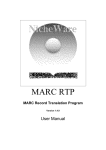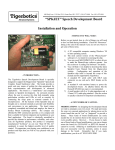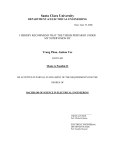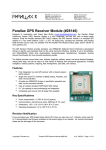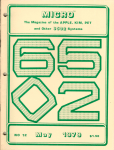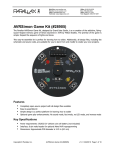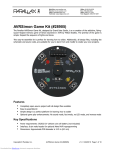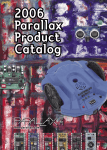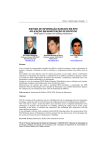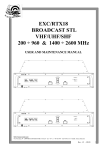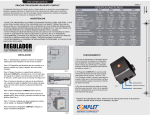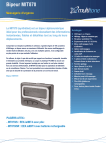Download RFID Reader Module (#28140)
Transcript
599 Menlo Drive, Suite 100 Rocklin, California 95765, USA Office: (916) 624-8333 Fax: (916) 624-8003 General: [email protected] Technical: [email protected] Web Site: www.parallax.com Educational: www.stampsinclass.com RFID Reader Module (#28140) RFID 54 mm x 85 mm Rectangle Tag (#28141) RFID 50 mm Round Tag (#28142) 2.45” (62.2mm) 3.25” (82.5mm) VCC /ENABLE SOUT GND idea studio 2.95” (75mm) 2.15” (54.5mm) 0.14” (3.6mm) 0.1” (2.5mm) Introduction Designed in cooperation with Grand Idea Studio (http://www.grandideastudio.com/), the Parallax Radio Frequency Identification (RFID) Reader Module is the first low-cost solution to read passive RFID transponder tags up to 1 ¾” - 3” inches away depending on the tag (see list below). The RFID Reader Module can be used in a wide variety of hobbyist and commercial applications, including access control, automatic identification, robotics navigation, inventory tracking, payment systems, and car immobilization. • • • • • Fully-integrated, low-cost method of reading passive RFID transponder tags 1-wire, 2400 baud Serial TTL interface to PC, BASIC Stamp® and other processors Requires single +5VDC supply Bi-color LED for visual indication of activity 0.100” pin spacing for easy prototyping and integration Parallax, Inc. • RFID Reader Module (#28140) •Updated 09/2005 v1.1 Page 1 The Parallax RFID Reader Module works exclusively with the EM Microelectronics-Marin SA EM4100-family of passive read-only transponder tags. A variety of different tag types and styles exist with the most popular made available from Parallax. Each transponder tag contains a unique identifier (one of 240, or 1,099,511,627,776, possible combinations) that is read by the RFID Reader Module and transmitted to the host via a simple serial interface. Electronic Connections The Parallax RFID Reader Module can be integrated into any design using only four connections (VCC, /ENABLE, SOUT, GND). Use the following circuit for connecting the Parallax RFID Reader Module to the BASIC Stamp microcontroller: Pin 1 2 Pin Name VCC /ENABLE Type P I Function System power, +5V DC input. Module enable pin. Active LOW digital input. Bring this pin LOW to enable the RFID reader and activate the antenna. 3 SOUT O Serial Out. TTL-level interface, 2400bps, 8 data bits, no parity, 1 stop bit. 4 GND G System ground. Connect to power supply’s ground (GND) terminal. Note: Type: I = Input, O = Output, P = Power, G = Ground Parallax, Inc. • RFID Reader Module (#28140) •Updated 09/2005 v1.1 Page 2 Communication Protocol Implementation and usage of the RFID Reader Module is straightforward. BASIC Stamp 1, 2, and SX28AC/DP code examples (SX/B) are included at the end of this documentation. The RFID Reader Module is controlled with a single TTL-level active-low /ENABLE pin. When the /ENABLE pin is pulled LOW, the module will enter its active state and enable the antenna to interrogate for tags. The current consumption of the module will increase dramatically when the module is active. A visual indication of the state of the RFID Reader Module is given with the on-board LED. When the module is successfully powered-up and is in an idle state, the LED will be GREEN. When the module is in an active state and the antenna is transmitting, the LED will be RED. The face of the RFID tag should be held parallel to the front or back face of the antenna (where the majority of RF energy is focused). If the tag is held sideways (perpendicular to the antenna) you'll either get no reading or a poor reading. Only one transponder tag should be held up to the antenna at any time. The use of multiple tags at one time will cause tag collisions and confuse the reader. The two tags available in the Parallax store have a read distance of approximately 3 inches. Actual distance may vary slightly depending on the size of the transponder tag and environmental conditions of the application. When a valid RFID transponder tag is placed within range of the activated reader, the unique ID will be transmitted as a 12-byte ASCII string via the TTL-level SOUT (Serial Output) pin in the following format: MSB Start Byte (0x0A) LSB Unique ID Digit 1 Unique ID Digit 2 Unique ID Digit 3 Unique ID Digit 4 Unique ID Digit 5 Unique ID Digit 6 Unique ID Digit 7 Unique ID Digit 8 Unique ID Digit 9 Unique ID Digit 10 Stop Byte (0x0D) The start byte and stop byte are used to easily identify that a correct string has been received from the reader (they correspond to a line feed and carriage return characters, respectively). The middle ten bytes are the actual tag's unique ID. All communication is 8 data bits, no parity, 1 stop bit, non-inverted, least significant bit first (8N1). The baud rate is configured for 2400bps, a standard communications speed supported by most any microprocessor or PC, and cannot be changed. The Parallax RFID Reader Module initiates all communication. The Parallax RFID Reader Module can connect directly to any TTL-compatible UART or to an RS232-compatible interface by using an external level shifter. Absolute Maximum Ratings and Electrical Characteristics Condition Operating Temperature Storage Temperature Supply Voltage (VCC) Ground Voltage (VSS) Voltage on any pin with respect to VSS Value -40ºC to +85ºC -55ºC to +125ºC +4.5V to +5.5V 0V -0.3V to +7.0V Stresses above those listed under “Absolute Maximum Ratings” may cause permanent damage to the device. This is a stress rating only and functional operation of the device at those or any other conditions above those indicated in the operation listings of this specification is not implied. Exposure to maximum rating conditions for extended periods may affect device reliability. Parallax, Inc. • RFID Reader Module (#28140) •Updated 09/2005 v1.1 Page 3 DC Characteristics At VCC = +5.0V and TA = 25ºC unless otherwise noted Parameter Supply Voltage Supply Current, Idle Supply Current, Active Input LOW voltage Input HIGH voltage Output LOW voltage Output HIGH voltage Symbol VCC IIDLE ICC VIL VIH VOL VOH Test Conditions ------+4.5V <= VCC <= +5.5V +4.5V <= VCC <= +5.5V VCC = +4.5V VCC = +4.5V Specification Min. Typ. Max. 4.5 5.0 5.5 --10 ----90 ------0.8 2.0 --------0.6 VCC - 0.7 ----- Unit V mA mA V V V V RFID Tags Available From Parallax Parallax provides two passive RFID tags from our on-line store. We’re stocking the tags because many suppliers have high minimums, yet many of our customers may only want a few tags for their basic experimentation. • • 54 mm x 85 mm Rectangle Tag (#28141) 50 mm Round Tag (#28142) 1.97” (50mm) dI qu e ndu nd t ic an po ni U ID - L o g i s er RF G TA r Wo ld Ø.17” (4.3mm) hole r an s t r i al T s 0.8” (2.1mm) thick Actual tag dimensions may vary. Contact Parallax for specific information. Parallax, Inc. • RFID Reader Module (#28140) •Updated 09/2005 v1.1 Page 4 Optional Tag Information Even though Parallax only carries a Round Tag and a Rectangle Tag the following values were obtained from different tags available in the market. ISO Card: World Tag 50mm: World Tag 30mm: Bobsleigh Keyfob: Tear shape: Wristband: 6.3cm 6.8cm 5.3cm 5.3cm 4.0cm 4.0cm (2.5") +/(2.7") +/(2.1") +/(2.1") +/(1.6") +/(1.6") +/- 10% 10% 10% 10% 10% 10% RFID Technology Overview Material in this section is based on information provided by the RFID Journal (www.rfidjournal.com). Radio Frequency Identification (RFID) is a generic term for non-contacting technologies that use radio waves to automatically identify people or objects. There are several methods of identification, but the most common is to store a unique serial number that identifies a person or object on a microchip that is attached to an antenna. The combined antenna and microchip are called an "RFID transponder" or "RFID tag" and work in combination with an "RFID reader" (sometimes called an "RFID interrogator"). An RFID system consists of a reader and one or more tags. The reader's antenna is used to transmit radio frequency (RF) energy. Depending on the tag type, the energy is "harvested" by the tag's antenna and used to power up the internal circuitry of the tag. The tag will then modulate the electromagnetic waves generated by the reader in order to transmit its data back to the reader. The reader receives the modulated waves and converts them into digital data. In the case of the Parallax RFID Reader Module, correctly received digital data is sent serially through the SOUT pin. There are two major types of tag technologies. "Passive tags" are tags that do not contain their own power source or transmitter. When radio waves from the reader reach the chip’s antenna, the energy is converted by the antenna into electricity that can power up the microchip in the tag (known as "parasitic power"). The tag is then able to send back any information stored on the tag by reflecting the electromagnetic waves as described above. "Active tags" have their own power source and transmitter. The power source, usually a battery, is used to run the microchip's circuitry and to broadcast a signal to a reader. Due to the fact that passive tags do not have their own transmitter and must reflect their signal to the reader, the reading distance is much shorter than with active tags. However, active tags are typically larger, more expensive, and require occasional service. The RFID Reader Module is designed specifically for low-frequency (170 kHz) passive tags. Frequency refers to the size of the radio waves used to communicate between the RFID system components. Just as you tune your radio to different frequencies in order to hear different radio stations, RFID tags and readers have to be tuned to the same frequency in order to communicate effectively. RFID systems typically use one of the following frequency ranges: low frequency (or LF, around 170 kHz), high frequency (or HF, around 13.56 MHz), ultra-high frequency (or UHF, around 868 and 928 MHz), or microwave (around 2.45 and 5.8 GHz). It is generally safe to assume that a higher frequency equates to a faster data transfer rate and longer read ranges, but also more sensitivity to environmental factors such as liquid and metal that can interfere with radio waves. There really is no such thing as a "typical" RFID tag. The read range of a tag ultimately depends on many factors: the frequency of RFID system operation, the power of the reader, and interference from other RF devices. Balancing a number of engineering trade-offs (antenna size v. reading distance v. power v. Parallax, Inc. • RFID Reader Module (#28140) •Updated 09/2005 v1.1 Page 5 manufacturing cost), the Parallax RFID Reader Module's antenna was designed with a specific inductance and "Q" factor for 170kHz RFID operation at a tag read distance of up to 1 ¾” - 3” inches. Example Code The following code examples read tags from a RFID Reader Module and compare the values to known tags (stored in an EEPROM table). ' ========================================================================= ' ' File....... RFID.BS1 ' Purpose.... RFID Tag Reader / Simple Security System ' Author..... (c) Parallax, Inc. -- All Rights Reserved ' E-mail..... [email protected] ' Started.... ' Updated.... 07 FEB 2005 ' ' {$STAMP BS1} ' {$PBASIC 1.0} ' ' ========================================================================= ' -----[ Program Description ]--------------------------------------------' ' Reads tags from a Parallax RFID reader and compares to known tags (stored ' in EEPROM table). If tag is found, the program will disable a lock. ' -----[ Revision History ]------------------------------------------------ ' -----[ I/O Definitions ]------------------------------------------------SYMBOL SYMBOL SYMBOL SYMBOL Enable RX Spkr Latch = = = = 0 1 2 3 ' ' ' ' low = reader on serial from reader speaker output lock/latch control ' -----[ Constants ]------------------------------------------------------SYMBOL LastTag = 2 ' 3 tags; 0 to 2 ' -----[ Variables ]------------------------------------------------------SYMBOL SYMBOL SYMBOL SYMBOL SYMBOL SYMBOL SYMBOL SYMBOL SYMBOL SYMBOL tag0 tag1 tag2 tag3 tag4 tag5 tag6 tag7 tag8 tag9 = = = = = = = = = = B0 B1 B2 B3 B4 B5 B6 B7 B8 B9 SYMBOL SYMBOL SYMBOL tagNum pntr char = B10 = B11 = B12 ' RFID bytes buffer ' from EEPROM table ' pointer to char in table ' character from table Parallax, Inc. • RFID Reader Module (#28140) •Updated 09/2005 v1.1 Page 6 ' -----[ EEPROM Data ]----------------------------------------------------Tags: EEPROM EEPROM EEPROM EEPROM EEPROM ("0F0184F20B") ("0F01D9D263") ("04129C1B43") ("0000000000") ("0000000000") ' valid tags ' space for other tags ' -----[ Initialization ]-------------------------------------------------Reset: HIGH Enable LOW Latch ' turn of RFID reader ' lock the door! ' -----[ Program Code ]---------------------------------------------------Main: LOW Enable ' SERIN RX, T2400, ($0A) ' SERIN RX, T2400, tag0, tag1, tag2, tag3, tag4 ' SERIN RX, T2400, tag5, tag6, tag7, tag8, tag9 HIGH Enable ' Check_List: FOR tagNum = 0 TO pntr = tagNum * IF char <> tag0 pntr = tagNum * IF char <> tag1 pntr = tagNum * IF char <> tag2 pntr = tagNum * IF char <> tag3 pntr = tagNum * IF char <> tag4 pntr = tagNum * IF char <> tag5 pntr = tagNum * IF char <> tag6 pntr = tagNum * IF char <> tag7 pntr = tagNum * IF char <> tag8 pntr = tagNum * IF char <> tag9 GOTO Tag_Found Bad_Char: NEXT LastTag 10 + 0 : READ THEN Bad_Char 10 + 1 : READ THEN Bad_Char 10 + 2 : READ THEN Bad_Char 10 + 3 : READ THEN Bad_Char 10 + 4 : READ THEN Bad_Char 10 + 5 : READ THEN Bad_Char 10 + 6 : READ THEN Bad_Char 10 + 7 : READ THEN Bad_Char 10 + 8 : READ THEN Bad_Char 10 + 9 : READ THEN Bad_Char Bad_Tag: SOUND Spkr, (25, 80) PAUSE 1000 GOTO Main Tag_Found: DEBUG #tagNum, CR HIGH Latch SOUND Spkr, (114, 165) LOW Latch pntr, char activate the reader wait for header get tag bytes deactivate reader ' scan through known tags ' read char from DB ' compare with tag data pntr, char pntr, char pntr, char pntr, char pntr, char pntr, char pntr, char pntr, char pntr, char ' all match -- good tag ' groan ' ' ' ' for testing remove latch beep restore latch Parallax, Inc. • RFID Reader Module (#28140) •Updated 09/2005 v1.1 Page 7 GOTO Main END ' ========================================================================= ' ' File....... RFID.BS2 ' Purpose.... RFID Tag Reader / Simple Security System ' Author..... (c) Parallax, Inc. -- All Rights Reserved ' E-mail..... [email protected] ' Started.... ' Updated.... 07 FEB 2005 ' ' {$STAMP BS2} ' {$PBASIC 2.5} ' ' ========================================================================= ' -----[ Program Description ]--------------------------------------------' ' Reads tags from a Parallax RFID reader and compares to known tags (stored ' in EEPROM table). If tag is found, the program will disable a lock. ' -----[ Revision History ]------------------------------------------------ ' -----[ I/O Definitions ]------------------------------------------------Enable RX Spkr Latch PIN PIN PIN PIN 0 1 2 3 ' ' ' ' low = reader on serial from reader speaker output lock/latch control ' -----[ Constants ]------------------------------------------------------#SELECT $STAMP #CASE BS2, BS2E, BS2PE T1200 CON 813 T2400 CON 396 T4800 CON 188 T9600 CON 84 T19K2 CON 32 TMidi CON 12 T38K4 CON 6 #CASE BS2SX, BS2P T1200 CON 2063 T2400 CON 1021 T4800 CON 500 T9600 CON 240 T19K2 CON 110 TMidi CON 60 T38K4 CON 45 #CASE BS2PX T1200 CON 3313 T2400 CON 1646 T4800 CON 813 T9600 CON 396 T19K2 CON 188 TMidi CON 108 T38K4 CON 84 #ENDSELECT Parallax, Inc. • RFID Reader Module (#28140) •Updated 09/2005 v1.1 Page 8 SevenBit Inverted Open Baud CON CON CON CON #SELECT $STAMP #CASE BS2, BS2E TmAdj CON FrAdj CON #CASE BS2SX TmAdj CON FrAdj CON #CASE BS2P TmAdj CON FrAdj CON #CASE BS2PE TmAdj CON FrAdj CON #CASE BS2Px TmAdj CON FrAdj CON #ENDSELECT LastTag CON $2000 $4000 $8000 T2400 $100 $100 ' x 1.0 (time adjust) ' x 1.0 (freq adjust) $280 $066 ' x 2.5 ' x 0.4 $3C5 $044 ' x 3.77 ' x 0.265 $100 $0AA ' x 1.0 ' x 0.665 $607 $2A ' x 6.03 ' x 0.166 3 #DEFINE __No_SPRAM = ($STAMP < BS2P) ' does module have SPRAM? ' -----[ Variables ]------------------------------------------------------#IF __No_SPRAM #THEN buf VAR #ELSE chkChar VAR #ENDIF tagNum idx char VAR VAR VAR Byte(10) ' RFID bytes buffer Byte ' character to test Nib Byte Byte ' from EEPROM table ' tag byte index ' character from table ' -----[ EEPROM Data ]----------------------------------------------------Tag1 Tag2 Tag3 DATA DATA DATA "0F0184F20B" "0F01D9D263" "04129C1B43" Name0 Name1 Name2 Name3 DATA DATA DATA DATA "Unauthorized", CR, 0 "George Johnston", CR, 0 "Dick Miller", CR, 0 "Mary Evans", CR, 0 ' valid tags ' -----[ Initialization ]-------------------------------------------------Reset: HIGH Enable LOW Latch ' turn of RFID reader ' lock the door! Parallax, Inc. • RFID Reader Module (#28140) •Updated 09/2005 v1.1 Page 9 ' -----[ Program Code ]---------------------------------------------------Main: LOW Enable #IF __No_SPRAM #THEN SERIN RX, T2400, [WAIT($0A), STR buf\10] #ELSE SERIN RX, T2400, [WAIT($0A), SPSTR 10] #ENDIF HIGH Enable Check_List: FOR tagNum = 1 TO LastTag FOR idx = 0 TO 9 READ (tagNum - 1 * 10 + idx), char #IF __No_SPRAM #THEN IF (char <> buf(idx)) THEN Bad_Char #ELSE GET idx, chkChar IF (char <> chkChar) THEN Bad_Char #ENDIF NEXT GOTO Tag_Found Bad_Char: NEXT ' activate the reader ' wait for hdr + ID ' deactivate reader ' scan through known tags ' scan bytes in tag ' get tag data from table ' compare tag to table ' read char from SPRAM ' compare to table ' all bytes match! ' try next tag Bad_Tag: tagNum = 0 GOSUB Show_Name FREQOUT Spkr, 1000 */ TmAdj, 115 */ FrAdj PAUSE 1000 GOTO Main ' print message ' groan Tag_Found: GOSUB Show_Name HIGH Latch FREQOUT Spkr, 2000 */ TmAdj, 880 */ FrAdj LOW Latch GOTO Main ' ' ' ' print name remove latch beep restore latch END ' -----[ Subroutines ]----------------------------------------------------' Prints name associated with RFID tag Show_Name: DEBUG DEC tagNum, ": " LOOKUP tagNum, [Name0, Name1, Name2, Name3], idx DO READ idx, char IF (char = 0) THEN EXIT DEBUG char idx = idx + 1 LOOP RETURN ' point to first character ' ' ' ' read character from name if 0, we're done otherwise print it point to next character Parallax, Inc. • RFID Reader Module (#28140) •Updated 09/2005 v1.1 Page 10










